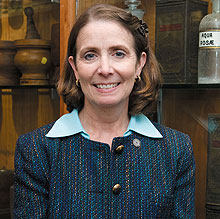  |
| HOME | THIS ISSUE | CALENDAR | GRANTS | BACK ISSUES | < BACK | NEXT > |
Academic administrators find leadership training helpfulby Sherry Fisher - November 13, 2007 | ||||
| Two UConn administrators spent almost a month this summer attending classes, workshops, and seminars to learn more about higher education – and themselves. Andrea Hubbard, associate dean in the School of Pharmacy, and Lin Klein, associate dean in the School of Business, participated in the HERS Bryn Mawr Summer Institute for Women in Higher Education in July. Held on the Bryn Mawr College campus in Pennsylvania, the residential program offers female administrators and faculty intensive training in education administration. Seventy women from 30 states, Guam, and South Africa were selected for the Institute. They came from four-year liberal arts colleges, major research universities, and community colleges. Participants were in class for at least six hours a day, including several hours on weekends. “We got to interact with successful administrators who talked about what contributed to their success,” Hubbard says, noting that living on the campus for nearly four weeks was an advantage. “We were immersed in the experience and got to interact with many different people.” Hubbard says the institute originally started “when women’s traditional roles were expanding. Women were moving into more non-traditional fields like law, business, and medicine. There were few women in leadership positions at universities, and the idea was to give women the tools to move up the ladder.” Hubbard came to the University as an assistant professor in the School of Pharmacy in 1988. In 2004, after an internal search, she was offered the job of associate dean. So that she would be better prepared for the position, the dean of the school had her “shadow” the retiring associate dean for a year. Robert McCarthy, dean of pharmacy, says such shadowing is useful for someone moving into a new position. “I think it really helps prepare and develop skills,” McCarthy says. “Placing a faculty member in an administrative position without the proper training can be overwhelming. Oftentimes, we take faculty who are very good at what they do and put them in administrative positions without giving them the tools to help them succeed. That’s why leadership opportunities are so important.” Hubbard says she took away a lot of helpful tips this summer. One of the discussions she found particularly interesting was knowing when to say yes to a challenge, and when to say no. “Very often women are chosen to serve on work-intensive, low-visibility committees because it’s known that they will get the work done,” Hubbard says. “Women are good at multitasking. But who gets the recognition? Learning to say yes or no to those kinds of requests is an important skill.”
The women at the institute had many common challenges, Hubbard says. “Regardless of age, institution, or part of the country we were from, there was a lot of, ‘Oh, you’ve had that problem too.’” She says she was impressed with discussions about the important role of community colleges. “Community colleges may be one of the few options that an individual has for breaking out,” she says. “Taking community college courses at night, for instance, can help someone move to a higher position or help them decide to pursue a different career entirely.” Klein, who joined the School of Business faculty in 1988 and became associate dean in 2006, says attending the institute was “an opportunity to help me understand the breadth of issues facing higher education administration that I felt was missing in my background as a faculty member. It gave me a tremendous look at how higher education in general is positioned, the critical issues we face, and how various schools are approaching those issues.” Klein says she found one task particularly helpful. “We had to identify a local leadership project that we would be interested in bringing to fruition,” she says. “We were asked to think about the project before coming to the institute so that it could be enhanced through team discussion. “That forced me to step back from an incredibly busy schedule to think about the future and identify something I would really like to accomplish in this job,” Klein says. “I decided to work on developing a stronger undergraduate business community, with increased involvement of student leaders and alumni. I’ve already started implementation.” The conference also helped women understand and articulate their accomplishments and identify a career map. “That was valuable for those want to move into higher administration positions,” Klein says. She says she recommends taking part in leadership activities because “they help you hone your skill set, offer the opportunity to share ideas with other people, provide a wonderful peer support group, and give you a sense of confidence about what you’re doing.” |
| ADVANCE HOME UCONN HOME |

